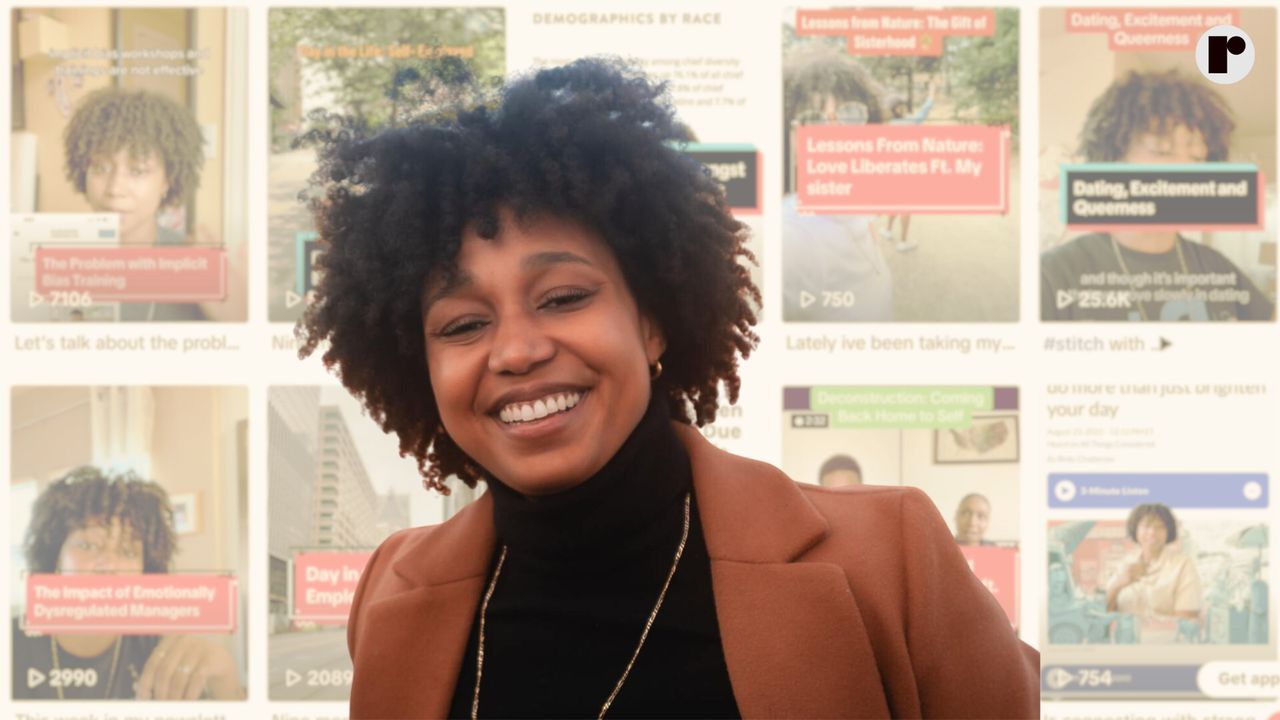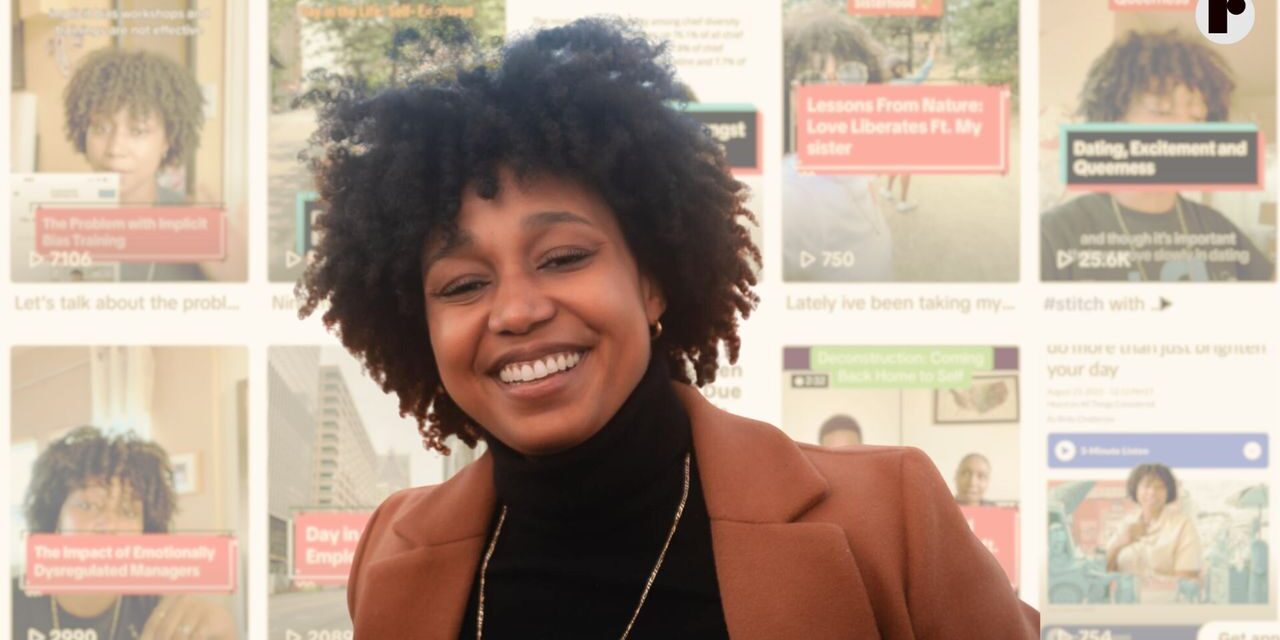
From snappy podcast interviews to TikTok gardening videos, content creator and public theologian Ciarra Jones is spreading the gospel of authentic, radically accepting theology in the places where people need hope-filled spirituality the most.
While she accepts the title, Jones describes herself as an “accidental public theologian.” The work she “stumbled” into through making gardening videos on her TikTok account has become something more healing and more meaningful than just a 9-5.
What makes her different from your typical theologian is her radically different view of God, suffering and self-identity. She constantly challenges her clients and followers to dare to imagine a God who truly loves them for who they are–flaws and all.
Reckon: You focus your work on helping people see themselves more fully and authentically in their chosen faith practice. Why is authenticity important to you?
Jones: A lot of the focus of my work is on LGBTQ religious inclusion. Even outside of queer folks and religion, this is an issue of religious trauma. Most people grow up in faith communities that have a theological idea called original sin, which is the idea that Eve ate the apple when she wasn’t supposed to and this created a separation between God and people. Many theological practices encourage dying to the self. Dying to self follows the belief that there’s nothing good in us. Everything good is in God. And so we want to kill the deepest parts of ourselves so that we can create space for the goodness of God. A lot of us are given frameworks of ourselves from a very young age in our church communities that frame ourselves as naturally bad and God as naturally good.
It’s hard to come to a positive figure like that that doesn’t want to see you or know you, or says you must change in all these radical ways to be seen.
Reckon: Let’s talk about God and the patriarchy. How have you reframed your view of God that’s different from the patriarchal male God that’s commonly presented in Christianity?
Jones: “God is a Black Woman” by Christena Cleveland, which I talk about a lot on my page, is one of my favorite books. In the book she talks about how a patriarchal God and a white male God is transcendent of our pain and our heartbreak. He lives in the sky, right? So he’s not directly involved.
It’s not about making fun of a patriarchal God. It’s also calling out this framework of God existing as an overseer above us invested in living in the messiness of life. In the book, she doesn’t reduce women to nurturers, but she says that women are often wiping our snot, they’re sitting with us in the trenches of our pain. The point is changing where we locate God. If God is apart from us, apart from our bodies, apart from human experience– what she challenges us to think about in this text is how God is actually in the space in between us in connection to our being. She refers to this as “The God our hot mess.” I love that.
Getting out of this mindset of original sin, dying to the self framing and instead seeing how God in all of this gunk with us? That is a much more accessible God, in my opinion.
Reckon: A lot of more traditional theologians really cling to this idea of the authoritative male God. Why do they cling to that? Why are some folks offended by thinking of God as Black woman?
Jones: I think that one way that whiteness upholds itself is not only to say that white people are uniquely special, but also that white people are uniquely connected to God. White people have unique access to God. I actually think the axis of systemic inequality is spiritual inequality.
Who gets to lay claims to God? Who gets to define God? Because whatever can define God also has social political power because they’re defining what is morally right, our societal norms. One thing I’ll say is when God is white, it’s a lot easier to create policies and practices and systems that privilege whiteness because, well, God looks like this.
So why would we not also systematically protect who we’re saying is spiritually special? I think the axis of white supremacy is saying ‘God loves white people more. God sees white people more.’ When God becomes a Black woman, we have to examine how Black women are treated systemically in the world. If we’re saying black women are sacred, worthy, and uniquely valuable, then we need to look at the maternity death rates of Black women. We need to look at rape and sexual assault of Black women. We need to look at HIV rates, domestic violence experiences, incarceration rates among Black women.
If God becomes our own human metric with who deserves protection and who deserves denigration, worshiping a black woman God necessitates giving up systemic power. But I also think worshiping a Black female God means asking themselves, why can’t I see Blackness as sacred or why haven’t I seen it?
Reckon: How does having this fresher, more integrated, view of God and divinity affect someone’s psyche? As a theologian, how do you get to enjoy that and see that transformation in them?
Jones: I love that question. This actually makes you think of when I was at Harvard. I ran their religion, gender, and sexuality program. That program came into fruition because Jackie Hill Perry, author of “Gay Girl, Good God” had come to our campus, and shared all this ex-gay rhetoric.
Her visit to campus caused a lot of pain, and as a result this program came about. We had like 50 to 70 people attend. Itt was students, but there were also a lot of folks in the community. I’m talking about folks between 50 and 80 years old who, the old gays, coming up to me and saying “I’ve never heard a conception of God that loved me. I never heard a conception of God that saw me. I didn’t even know queer theology existed.
I left the church a decade ago and I didn’t know that there was any avenue for me to return to my faith. That was the most special moment for me was being able to realize that ageism can come into liberation work because we can kind of forget about the older folks in the queer community who have never gotten this message who have been scraping by to live authentically. What’s so special for me is reaching folks who are older who have told me “I can live more freely than I’ve ever lived.”
Reckon: What is queer theology?
Jones: A Queer Womanist Theology by Pamela Lightsey is all about how queer people experience and engage with God. And something that’s powerful about queer theology is that it helps queer people get unstuck. Queer theology does not emphasize biblical text, because for a lot of queer people, biblical text can be a site of trauma and getting them to turn back to the text is hard. You’re condemned in Romans. You’re condemned in Leviticus. You’re condemned in Genesis. It’s hard to read that.
Many queer theologians actually believe the Bible can be as imperfect. Her book is all about how do we as queer people experience God? Like, when you’re walking around the world, when you’re living in your body, do you feel love from the world around you? Do you feel love from the universe?
Why is that not God? She really challenges queer people to examine their experience of rejection and to consider locating God, not just in the church, but in their own experience of the world and trusting their experiential reality.
If you’re in a church and you’re, and they’re saying something homophobic, that isn’t you being a weak Christian. It just might actually be that you don’t deserve to have a core part of you be rejected by the church. Queer theology really empowers queer people to think about their experience of God, and trusting themselves to know who God is.
Reckon: Why is spirituality important in the modern era? Isn’t religion and spirituality antiquated and useless for our modern time?
Jones: Spirituality has become such a contentious word, but we all do have this spiritual part of ourselves that needs connection and community and belonging.
When I used to work at Cal StateLos Angeles, I ran their LGBTQ center, and I ran a program for our therapists about the intersection of religion and LGBTQ identity. I noticed that a lot of therapists, when they have queer students that have religious trauma, the first thing they’ll kind of guide them towards is releasing their faith practice if it makes them feel rejected.
Instead, I suggested therapists actually give people an option to reframe their faith practice. If you say “to love yourself, you have to leave this,” you’re saying that God and queerness exist in opposition and that’s not true. It’s just the frameworks are what’s oppositional.
For queer folks who have walked away from their faith to accept themselves, they sometimes feel a deep grief or emptiness because they don’t have that access to spiritual support. There’s so much that spirituality does for us. For me, my spirituality helps me release my anxiety. There is this beauty of knowing a universe is supporting me that I don’t have to manage my own life by myself. I think there’s the mental health benefit of believing in something beyond the self, because it makes us feel like our life is a collective endeavor where we’re walking alongside someone or something else. I think we all need that sense of support.
When it comes to communities of color, black communities, spiritual communities are cultural connections. A majority of black folks have attended church in their life or come from religious families.
I want to be that place where they can say “my faith practice isn’t working for me, but do I want to release it? Or do I want to re-envision it?” When I was 19, I dropped my faith because I was so traumatized by it. I had to really grieve that experience of leaving my church and all the support there.
Reckon: For the person who has left church, and maybe wants to come back, but is still scared and traumatized, where should they start reintroducing themselves to their own spirituality?
Jones: The first advice I would give them is to have radical self compassion. When we learn that God isn’t a God who loves our grief, or loves our messiness, or everything, we can learn to repress and dampen our own emotional reality and spectrum of emotions.
I want to honor the grief and the fear and the terror that you might experience as you kind of imagine coming back into faith. If returning to faith is too scary, I want you to have a five minute meditation practice every week where you just imagine for five minutes you imagine that there is a God or a spirit or being beyond you that loves you fully. Start with exposure therapy to radical love, because that’s really what I find that people are afraid of. You’ve been taught your whole life to kill parts of yourself to receive love. I want to give people a framework of theology that says you are beautiful as you are.
Sit for five minutes and imagine a being that radically loves you and see how difficult it is for us to trust that we’re deeply worthy, but also see how much easier it gets over time.
For more info, check out Jones’ website, TikTok and other social media pages.





